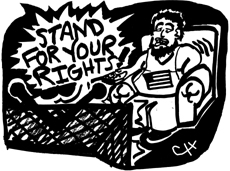Opinion: Complacency

Chris Hampson
October 15, 2004
Of all the effects that the Sept. 11, 2001 attacks had on this country – including increased racism, blind patriotism and the use of the word “terrorism” to excuse any injustice – by far the worst has been the way U.S. citizens have entrenched themselves in complacency. What makes complacency the worst outcome is that it lends silent support to everything else.
Someone recently said, “Patriotism is the Rohypnol of the American public.” Though partly true, this overlooks the bigger picture. Complacency is the greatest threat to both the world and our future. While patriotism might persuade people to act – often on false pretenses – complacency compels people not to act. It creates inertia rooted in material wealth, physical comfort, the fear of taking risk and the fear of change. Complacency quickly deadens our senses to all that would pull us out of it.
It is rooted in self-centeredness. You hear it when people blow off their guilt and moral responsibility by saying, “But you shouldn’t complain, because we’re so much better off than the rest of the world.” It takes the form of the Seven Deadly Sins from Dante’s Divine Comedy, particularly Gluttony, Greed, Vanity and Sloth – now hallmarks of our way of life. Complacency might be tightly integrated into our lifestyle, but most of us see nothing wrong with it – or don’t see it at all. That is complacency’s most deadly trap.
Many of us might be well aware of the suffering that our misguided wars (past and present) have caused; the continued corruption of our government by corporate entities; destructive environmental policies that threaten the planet and our very existence; our unsustainable resource usage; and the exploitation of third-world countries for resources and cheap labor. We might know about these things, but what have we done to stop them? Even the majority of active citizens will only speak out briefly before continuing their same materialistic, consumption-driven lifestyle.
Just for the simple sake of morality, U.S. citizens should be converging on the capital and demanding change while also learning to make serious sacrifices in their lives. However, most of us hardly do anything. We might attend a small protest, go to the polls to vote, complain publicly or, more commonly, not do anything at all. In fact, I can guarantee that everybody who reads this column will do little or nothing to make some real changes in their lives. On average, the effect of my words will disappear in five minutes or less (yes, that includes you, dear reader). Don’t worry, I’m including myself in there as well.
Get The Daily Illini in your inbox!
So what would it take to spur people into action? Obviously, having several planes slammed into two commercial towers and the headquarters of our military – taking the lives of roughly 2,800 civilians – did next to nothing (in fact, our gut reactions to those attacks have made everything worse). All the suffering and resentment we hear about in other countries usually gets ignored or blamed on something else. If our complacency is rooted in material wealth and physical comfort, maybe our only hope is to see what it’s like to live in a war-torn country’s shoes.
Maybe we need to have bombs dropped on our suburbs, targeting not only our homes but our schools and hospitals. Maybe our citizens need to see what it’s like to sift through the rubble of their homes to find the severed body parts of loved ones. Maybe we need to have another country install a ruthless dictator in the United States so that everyone else can profit from our resources and suffering. Better yet, maybe all of us should wake up and take responsibility for both our actions and inactions.
If the United States is the moral leader of the world, then all of us need to act like it for once.
Alex Dunkel is a University employee. His column runs alternate Fridays. He can be reached at [email protected].






